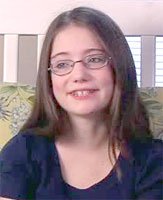
Skip section navigation (navigation may have changed)
Section navigation
Types of illnesses and disabilities
Congenital (say: kon-JEN-i-tuhl) disorders are illnesses and disabilities that start at birth (or before). If you have a congenital disorder, you have never experienced life without it.
Acquired (say: uh-KWEYE-urd) disorders are illnesses and disabilities that develop after you’re born. If you just developed a health condition, you may suddenly have a lot to handle.
Read two true stories below of girls with each kind of condition — and how they’re being super-smart about their health.
Being born with an illness or disability  top
top
 Meghan R. has had serious health problems since she was three months old. She has cystic fibrosis, which can make it hard for her to breathe, and other conditions. Sometimes, she needs to spend two weeks in the hospital at a time. But she has lots of good times, too. She loves dancing and singing and helping out other kids. “I just focus on the bright side of things,” she says. “I don’t look back. Life’s too short for regrets.”
Meghan R. has had serious health problems since she was three months old. She has cystic fibrosis, which can make it hard for her to breathe, and other conditions. Sometimes, she needs to spend two weeks in the hospital at a time. But she has lots of good times, too. She loves dancing and singing and helping out other kids. “I just focus on the bright side of things,” she says. “I don’t look back. Life’s too short for regrets.”
Meghan works hard to take good care of herself. “If I don’t do my medical treatments, I could die — soon,” she says. “So I keep up with my medical treatments every single day. Because my plan is to live until I’m 100.” Meghan hopes that someday she’ll become a doctor or nurse. Other people have helped her life so much that, she says, “I just want to make a difference in someone else’s too.” Children’s Hospital at Dartmouth, the hospital where Meghan gets treatments, made a video about her. Click here to hear more of her story.
If you have a congenital condition, like Meghan, you probably already know a lot about your particular illness or disability. And you probably also know that there’s a lot you can do to protect your health and build a good life for yourself.
Developing an illness or disability after birth  top
top
Rachel was only 5 years old when she was diagnosed with type 1 diabetes. Since then she’s learned a lot about staying well with a demanding disease. Here’s what she wants other kids to know:
 “Most people, even those who have diabetes, don't understand the basics of living with and handling diabetes. Most people think that you can't have sugar in your diet if you have diabetes. That's not true! You just have to control yourself about how much you are eating and be sure to correct how much insulin you take for the amount that you consumed.
“Most people, even those who have diabetes, don't understand the basics of living with and handling diabetes. Most people think that you can't have sugar in your diet if you have diabetes. That's not true! You just have to control yourself about how much you are eating and be sure to correct how much insulin you take for the amount that you consumed.
Living and staying healthy with diabetes can sometimes be a challenge. But if you have diabetes, you can definitely live healthy with it! I try to be athletic through track, for example. And support is always a good thing. If you have people who care about you to support you, you'll have an easier time living with diabetes — or any illness!”
If you’ve just learned you have an illness or disability, you may not know exactly what it means or what to expect. You may wonder, “How will this change my life?” or “How will I make it through this?” You may feel scared, confused, or overwhelmed. These feelings are normal. Here are some things you can do to feel better:
- Learn more about dealing with medical issues and coping with your feelings in this section of girlshealth.gov.
- Research your illness or disability. You can learn what it is, what causes it, how you manage it, and more. Check out our list of resources for specific conditions to help you live well with yours.
- Talk with caring adults such as parents, teachers, and doctors.
- Talk with other kids who have an illness or disability. Ask them about when they first found out and what they do to take care of themselves.
Whether you were born with an illness or disability or developed one after you were born, support from other kids with the same condition can really help. See if you can join a local support group. You also can join Ability Online or check out more online chatting information for kids with different kinds of health conditions. Other kids may have great tips — and know exactly how you feel!
Content last reviewed February 16, 2011
Page last updated October 31, 2013







